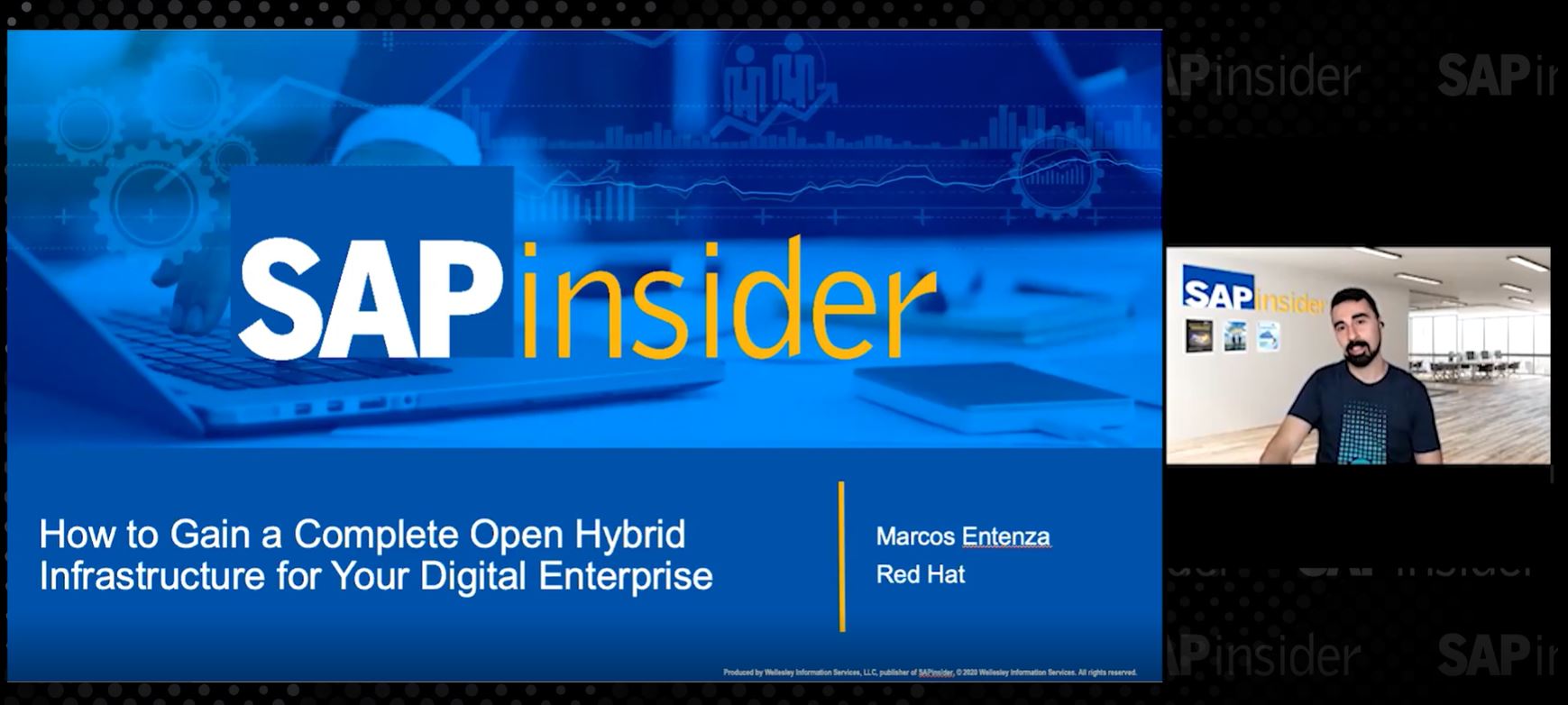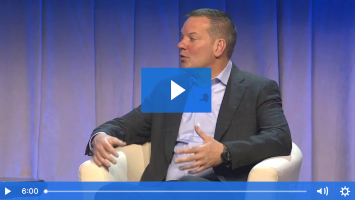SAPPHIRE NOW Keynote Highlights: Transformation, Community, and Sustainability
by Robert Holland, VP and Research Director, SAPinsider
As it was last year, the 2021 keynote for SAPPHIRE NOW was a virtual event featuring CEO Christian Klein. Unlike last year, the keynote was co-hosted by SAP’s new Chief Marketing and Strategy Officer Julia White. With the company less than 2 months, White hit the ground running and made several product announcements during the course of the keynote, as well as interviewing SAP founder and Head of the Supervisory Board, Hasso Plattner.
Transformation, Community, and Sustainability
There were three key insights that Klein spent the first portion of the keynote focusing on, and these were emphasized at multiple points throughout the presentation:
- The most resilient companies embrace technology to transform their business processes
- We win together as a community
- We must act now on sustainability: zero emissions, zero waste, zero inequality
When it comes to business transformation, Klein started by saying that calling something a transformation project doesn’t mean that it is. Not every IT project, and not every cloud project, transforms business processes. To fully embrace digital transformation, organizations must leave old business models behind. Klein emphasized that this must be powered by data and embedded artificial intelligence (AI), and that software must have the ability to map and understand existing processes capabilities. Klein said SAP has significant knowledge of underlying applications and so can easily map solution capabilities to existing process challenges. Using solutions from Signavio, SAP will release SAP Process Insights later this year to help organizations meet these transformation challenges. And with SAP Process Insights being integrated with SAP Intelligent Robotic Process Automation, the solution will introduce recommend improvements with corrective actions to fully transform business processes.
When it comes to Community, Klein stated that we are living in an interconnected world, and that many of the issues organizations face today stem from a reliance on global supply chains. To broaden this community, SAP plans to create the world’s largest and most comprehensive business network with SAP Business Network. The SAP Business Network will bring together the Ariba Network, the SAP Logistics Business Network, and the SAP Asset Intelligence Network connecting over 5.5 million enterprises. SAP intends to bring companies together by being able to discover each other based on criteria for quality certifications, sustainability, and diversity. Organizations will be able to access data from visibility providers to see the movement of goods, and track actual logistics carbon emissions. SAP also announced in the keynote that SAP will fast track the top 100 carriers and suppliers into the network for organizations who purchase the SAP Business Network.
One of the biggest topics for Klein’s keynote was that of sustainability. SAP wants to build sustainability into the way organizations do business, and will provide standard reporting and analytics on all sustainability metrics of the World Economic Forum. SAP wants to enable carbon footprint tracking across the entire business network, and White announced that SAP would announce several innovations around their sustainability portfolio. This includes SAP Product Footprint Management, and SAP Responsible Design and Production. SAP also intends to embed much of this reporting into existing solutions, ensuring that all SAP customers can ensure sustainability.
Klein summed up these topics from the keynote by saying, “We can reinvent how businesses run. We can reinvent how industries run by connecting to an industry-wide business network. We can reinvent how the world runs by making businesses sustainable.”
RISE with SAP and Innovation Announcements
The flagship RISE with SAP solution was also a major part of the keynote. Klein said that SAP plans to expand the offering beyond SAP S/4HANA Cloud since “customers want a holistic, modular, cloud ERP”. To this end, SAP will include both HR and procurement capabilities within the RISE solution, including a dedicated package for human experience management (HXM). In addition, White said that SAP knows that since each industry is different, there will also be RISE for SAP for industries. Starting with the retail, consumer products, automotive, utilities, and industrial machinery and components industries, the solution will provide “integration, extensibility, and analytics on the one data model”. These five industry offerings will just be the start, as SAP has experience with over 20 industries and plans to introduce more industry specific versions of RISE in the future.
Other solutions announced during the keynote included SAP Upscale Commerce, an online, no-code solution with built in AI to provide personalized offerings based on a 360-degree view based on customer sentiment and purchase data. Integrated with SAP S/4HANA, there will be capabilities to configure price quotes and links as well as revenue innovation management and predictive accounting. Everything from shopping to payment will be covered by the solution.
Also announced were new capabilities of the SAP Business Technology Platform. This will include SAP Analytics Cloud offering operational workforce analytics and planning capabilities as well as integration with SAP SuccessFactors solutions. SAP will also expand the capabilities of SAP Intelligent Robotic Process Automation to allow it to capture and automate user interactions and integrate with SAP Process Insights. And there will also be a new data marketplace for SAP Data Warehouse Cloud, which lets organizations connect to data providers across industries and lines of business to gain additional insights on their data and make better decisions.
Lastly, during the analyst call following the keynote Klein answered a question about SAP’s relationship with the hyperscale players, and his response was that their relationship has never been better. Klein stated emphatically that “SAP is not exclusive”. Whether you want to use Alibaba, AWS, Azure, or GCP, he emphasized that it is the customer’s choice. Klein also said that “on top of that it’s our platform”. Technical solutions that complement what SAP does is down to customer choice. He stressed that nothing has changed with RISE, as there is a clear definition of what the partnership looks like. White followed that up by saying “we have a good relationship with all the providers”.
What Does This Mean for SAPinsiders?
While the keynote focused on the high-level goals for SAP, the product announcements SAP made were very cloud focused. In addition, much of White’s discussion with Plattner focused on the cloud in addition to understanding and transforming business processes. Given the importance of the cloud to SAP’s future success, this should be no surprise to SAPinsiders. But what does this mean for you as an SAPinsider?
- Leverage the ability to transform your business processes. While 2020 caused many organizations to accelerate adoption of cloud-based technologies, and a lift and shift to a private or public cloud infrastructure has helped provide scalability and flexibility, as Klein stated this doesn’t mean that the business has undergone a transformation. When moving to solutions like SAP S/4HANA, use the tools and technology that is available to ensure that you are streamlining and updating your business processes. Doing so has a much greater potential positive impact on your operations than implementing new infrastructure.
- Explore the capabilities of the new SAP Business Network. SAP is looking to build the largest and most comprehensive global business network by merging their existing business networks. Whether or not you end up subscribing to the network, with the potential for over five and a half million member organizations, every SAPinsider should be at least exploring what the network offers and its capabilities for impacting your business. And with SAP offering to enroll your top 100 carriers and suppliers, this is the perfect opportunity to do so.
- Educate your teams on how sustainability will fit into SAP solutions. SAP is committed to, as Klein said during the keynote, “chasing zero together”. What he means by that is zero waste, zero inequality, and zero emissions. No matter what SAP solutions you are using, sustainability will become a part of the software – if not today then certainly in the future. Ensure that your teams are educated about what this means, and what impact it might have.
- Plan for the cloud. No matter where your solutions are running today from an infrastructure perspective, everything SAP is doing is focused on the cloud. There is absolutely a choice in terms of how and when you move there and what provider you use, but all of SAP’s major innovations moving forward will be in cloud-based applications. Even if you aren’t making any changes today, you need to educate your internal teams and prepare for at least some of your SAP applications to be running in the cloud.








